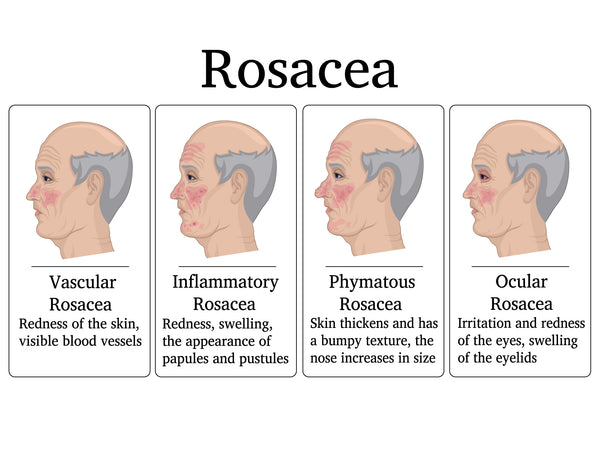Rosacea is actually quite a variable condition, but there are common symptoms that can help identify it.
Rosacea is a condition that affects the face, and is named after the colour of the affected skin (‘rosy’), so it stands to reason that the most obvious characteristic of rosacea is a reddened face!
Who is typically effected by rosacea?
Although rosacea most often affects white women after the age of 30, who are typically of English, Irish, Scottish and Scandinaivan ethnic backgrounds, especially those with pale skin and red hair, it does sometimes occur in people of BAME backgrounds.
It may be that, because it’s less visible on dark skin, rosacea is underdiagnosed in people of colour, so it’s hard to tell exactly how many people are affected.
In skin that doesn’t go red in the same way as white skin, rosacea is characterised more by sensation (heat, itchiness, tightness) than appearance.
In the demographic most obviously affected, mild rosacea looks something like a blush that doesn’t go away, but symptoms can be more widespread and varied than that suggests.
Symptoms of rosacea
- Reddened skin on the ‘central zone’ of the face: cheeks, nose, around the mouth and on the forehead, which can look a bit like localised sunburn.
- Hot, flushed, itchy skin on the cheeks that doesn’t fade as a normal blush would
- Bumps, pustules, pimples, and inflammation (papulopustular rosacea is often called ‘acne rosacea’ because of its similarity in appearance to acne.)
- Broken or visibly dilated red veins in the cheek and nose
- Thickened skin, especially on the nose. (Rosacea subtype 3 affects the nose and is known as phymatous rosacea.)
- Bloodshot, watery, irritated eyes (eyes are affected in 50% of rosacea cases: ocular rosacea requires diagnosis and treatment to prevent permanent damage)

Although rosacea is a chronic inflammatory condition that won’t disappear completely once it’s developed, there are things you can do to help yourself manage your rosacea flares!
Check out our article on Rosacea Awareness Month for more information about the condition. It’s also worth identifying and then avoiding your own dietary and environmental triggers; see our article What Foods Trigger Rosacea? for more information.
Recommended skincare products for rosacea
Balmonds Cooling Cream
with shea, menthol, aloe vera & lavender
Balmonds Intensive Facial Oil
with rosehip, calendula, lavender & chamomile






